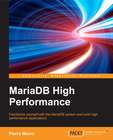You may remember the first introduction of that tool here. I’ve made changes to support tables’ partition, to avoid a big lock on huge tables.
The solution is to rebuild every partition one by one instead of rebuilding the whole table. This is smoother and less stressing Galera. I hope you’ll enjoy this new version (v0.2).
Note: I still got issues on MariaDB 10 with such thing, I’m working on it.




